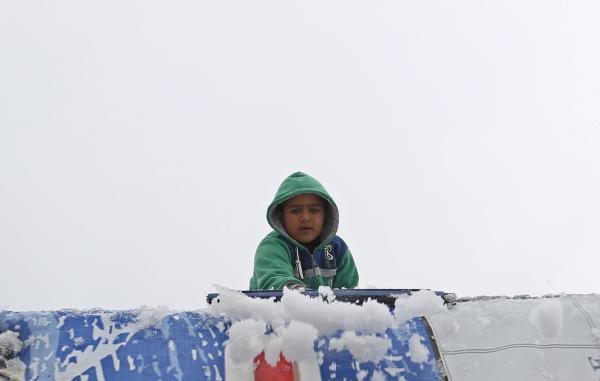BAR ELIAS, Lebanon, Jan 8 (Reuters) – Syrian refugee Hussein Hammoud is banking on a broom handle to protect his 12 children from the winter cold. He is using one to prop up the flimsy shelter that has already collapsed once this year under the weight of snow in Lebanon’s Bekaa Valley.
“The snow brought down the tent on our heads, it broke the wooden frame,” said the 37-year-old from southern Aleppo, a refugee from the war that has been raging in neighbouring Syria for nearly five years. “The assistance reaching us is very little in winter – no blankets, no mattresses.”
More than 1 million Syrians are enduring another winter as refugees in Lebanon. For some, it is their fifth in a row, displaced by a war that has driven 4.4 million Syrians into neighbouring states from where many are trying to reach Europe.
While the first snow has melted at Hammoud’s camp in Bar elias, rainfall permeates the plastic sheets that fail to fully shield those underneath from the elements. Some bear the emblems of U.N. aid agencies. Others are advertising hoardings.
The snow-capped mountains of nearby Mount Lebanon are visible from the camp comprising around 30 tents separated by a dirt pathway that turns to mud in winter. It is one of more than 3,000 such settlements scattered across Lebanon.
“We have no fuel. Nobody is giving us fuel, and the water in the tent is this much,” said a woman in a purple scarf who gave her name as Umm Khalaf, holding her hands apart to show how badly it had flooded.
The winter brings other problems, too. Refugees in remote areas stranded by snow cannot reach shops to buy food and water.
“Clean water freezes in the tanks, sanitation becomes an issue, and diseases can spread more easily,” said Fran Beyrtison, Lebanon representative of aid agency Oxfam.
“Lebanon and the UN recently issued an appeal to help up to 2.9 million vulnerable people. The international community needs to fund this appeal urgently to allow aid to reach people in need,” she said. The appeal, for $2.5 billion, includes vulnerable Lebanese in addition to Syrian refugees.
UNHCR, the U.N. refugee agency, has provided support including stoves, blankets, mattresses and “insulation kits” that include insulating foam and timber, though these are designed for refugees living in larger buildings, said Dana Sleiman, UNHCR spokeswoman in Lebanon.
“We did our best to make sure that refugees are able to stay as warm and dry as possible this winter and avoid some of the issues we saw last year, like flooding,” she said.
For Umm Khalaf and others at Bar elias, another problem is explaining the situation to their children.
“The children cry and ask ‘Why is this happening’? We reply ‘God will take care of it’. What can we do?” she said.

